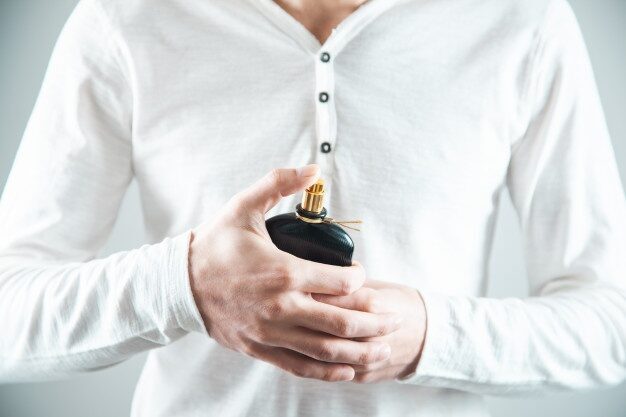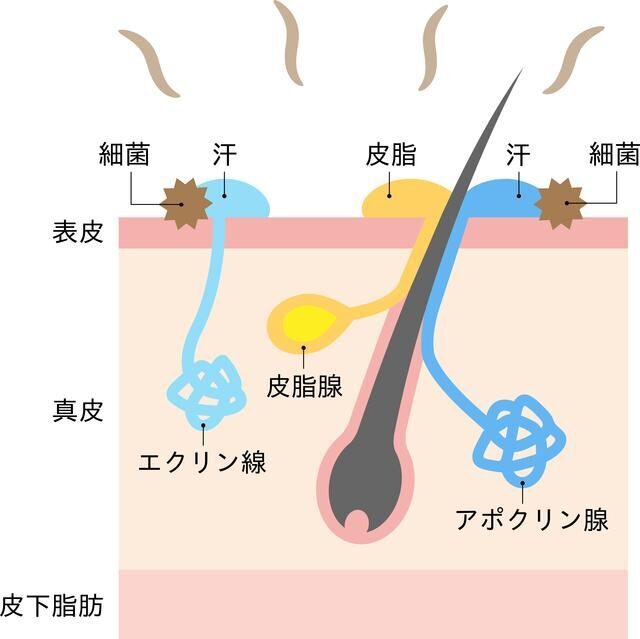Hello, Everyone!
It is now the middle of rainy season.
The weather will soon be very hot as summer approaches.
I hope you are well.
In Japan, many of us tend to turn our attention towards body odor in this heat, humidity, and wonder how to choose a perfume that is suitable to the season and weather.
It begs the questions: how does the mechanism for body odor work?

What about olfactory adaptation and something known as HLA (Human Leukocyte Antigen)?
Let’s attempt to address the preceding questions.
The Mechanism of Body Odor
It is a misconception that the body has an odor.
It has almost no odor, per se.
The human body secretes sweat to regulate temperature, while sebum is a by-product of metabolism.
Both are almost odorless at the time of excretion. However, bacteria feeds upon these substances and create fatty acids, protein, and steroids which are the building blocks of the body odor we commonly smell.
There are two types of sweat glands that secrete sweat are called eccrine glands and apocrine glands.
Each possesses different ways of secreting sweat.
Apocrine glands, which are under the armpit, are the main culprit in body odor.

Asians tend to have fewer apocrine glands than other races do around the globe, with Koreans possessing almost none at all.
In addition to the race, types of food, season and temperature, lifestyle, culture and work are other reasons for causing body odor.
Not only one’s living condition, but also emotions and mental condition in daily life can influence body odor.
Speaking of the workplace, doctors and nurses in hospitals smell of phenol in antiseptic solution while a baker smells of savory wheat.
Those of us in the fragrance industry are surrounded by aroma diffusers, air refreshers, and many fragrance-related products.
Our clients and customers say “you smell nice” when they visit us.
However, it is unlikely that any of us recognize the smell we’ve inherited from our environment.
The reason for this is the phenomenon called “olfactory adaptation”.
Olfactory Adaptation and HLA (Human Leukocyte Antigen)
Even though you can sense other people’s body odor, you can barely perceive your own.
Even though you can sense the smell of the other people’s house, you hardly smell anything upon returning home.
This is an example of olfactory adaptation.
It is an animal instinct we adapted long ago to protect ourselves from foreign enemies, and we’ve been programmed to perceive a danger from an unusual smell we sense.
Another important thing to remember is HLA or “Human Leukocyte Protein”, an antigen that exists on the surface of every cell, including white blood cells.
HLA is made of six sets of genes which exist as an immune system identifying yourself or others, to protect our bodies from pathogens.
Interestingly, the HLA of your mate will dictate the cellular immunity efficiency of your offspring.
The more the HLA of your mate varies from your own, the greater the cellular immunity. Due to this, evolution has seen fit to make a mate’s HLA smell more attractive if it differs from yours.
Genetically, we have our own scent fingerprint that will never change.
A female friend of mine shared her story about how she felt a delightful maternal instinct when she smelled her son’s scent while drying his hair.
I assume she felt this way because her son’s inherited HLA gene from his father combined with hair scent.
Her son might have inherited his father’s HLA type more than his mother’s.
Needless to say, it is only conjecture, but it does make sense.
Imbuing our offspring with more immunity variation gives them greater genetic artillery to battle bacteria, viruses and parasites.
As we can see, our instinct is truly programmed in an unconscious and evolutionary way to favour mates with different HLA.
Season and Clime Can Dictate the Scent. What Is the Right Perfume to Select?
Odor is very susceptible to the influence of weather, most notably in the dusty, sticky and muddy smell we notice after a rain.
We express this scent as oakmoss and vetiver, and it is said that the reason why the smells are stronger when the humidity is high is because the moisture content helps to enhance the aromatic components.
When I was in Paris, I was pleased to find a perfume which smelled lovely and suitable, but it fell short of my memory when applied in Japan.
This is because fragrance is affected by the local climate and humidity.
In Japan, the humidity is higher than in France, so the nuance of the perfume can land more heavily on the nose.
In Hong Kong, where the humidity is higher than in Japan (as high as 90% in March and April), it is even more important to choose your perfume and room fragrance carefully.

By now, I am sure you get an idea of why each person has their own unique smell.
In the next topic, I would like to discuss how to match your perfume to your unique body odor.
The Less Body Odor You Have, the More Scent Options You Have
This is only my perspective, but due to Japanese people’s fewer scent glands and bathing habits, we have more choices for perfumes.
As our ancestors were agrarian, they were not familiar with strong smells as they ate rice and vegetables as their staple food.
Also, “masking” was never a demand in Japanese history, which was used commonly in Medieval Europe to cover body odor, so it can be said fresh and light scents are more likable and familiar to Japanese.
In fact, in my experience, a gentle floral scent with citrus on top and green notes as an herbal scent is popular among Japanese people.
However, this does not apply to other ethnicities.
Due to their tendency to have a stronger body odor, citrus and green notes alone are often too subtle.
A heavier woody scent with ambergris or musk might suit them better.
In the wake of increasing globalization in recent years, the dietary habits of Japanese people have become more Westernized and diversified.
Meat-based meals and dairy products such as butter and cheese are also increasingly consumed by the Japanese, and the effects of food on our body odor are becoming readily apparent.
Perfume from a Pheromone Perspective
In terms of pheromones, androstenol (also known as musk odor) is famous among men and is a favorite scent ingredient for women as it gives them a whiff of masculinity.
Nowadays, synthetic musk is used everywhere.
The ingredients that excite our instinct have a power to attract people.
Therefore, it is better if you could aim for a fragrance that matches an already musky body odor.
In addition, the unique smell of human skin feels like it has a musk odor and a sandalwood-like aroma component.
Musk it is a powdery fragrance with a bit of warmth, so it might be good for Japanese people to explore a bit of animalic smell and develop their own unique identity in terms of scent.
In fact, I believe that many of the best perfumes in the West are tailored to the body odor of Westerners.
Most of them have a combination of animal and resinoid base notes (resinous fragrances extracted from trees and described as balsamic or vanillic).
I imagine that many perfumes have this combination as Westerners’ body odor is more potent, yet also a bit sweet.
Lastly,
It is said that perfume is an aspect of fashion.
Gabrielle Coco Chanel, the creator of Chanel perfume, said “Haute couture is completed by perfume.”
Body odor and environmental odor are not always easy to recognize when we’re immersed in it.
As the old proverb goes, “We cannot see the forest for the trees”.
One of the best ways to choose your own suitable scent is to try it on and elicit the opinions of those around you.
Whether it is a room fragrance or a perfume, the process of finding a scent that you like can be a very enjoyable process.
